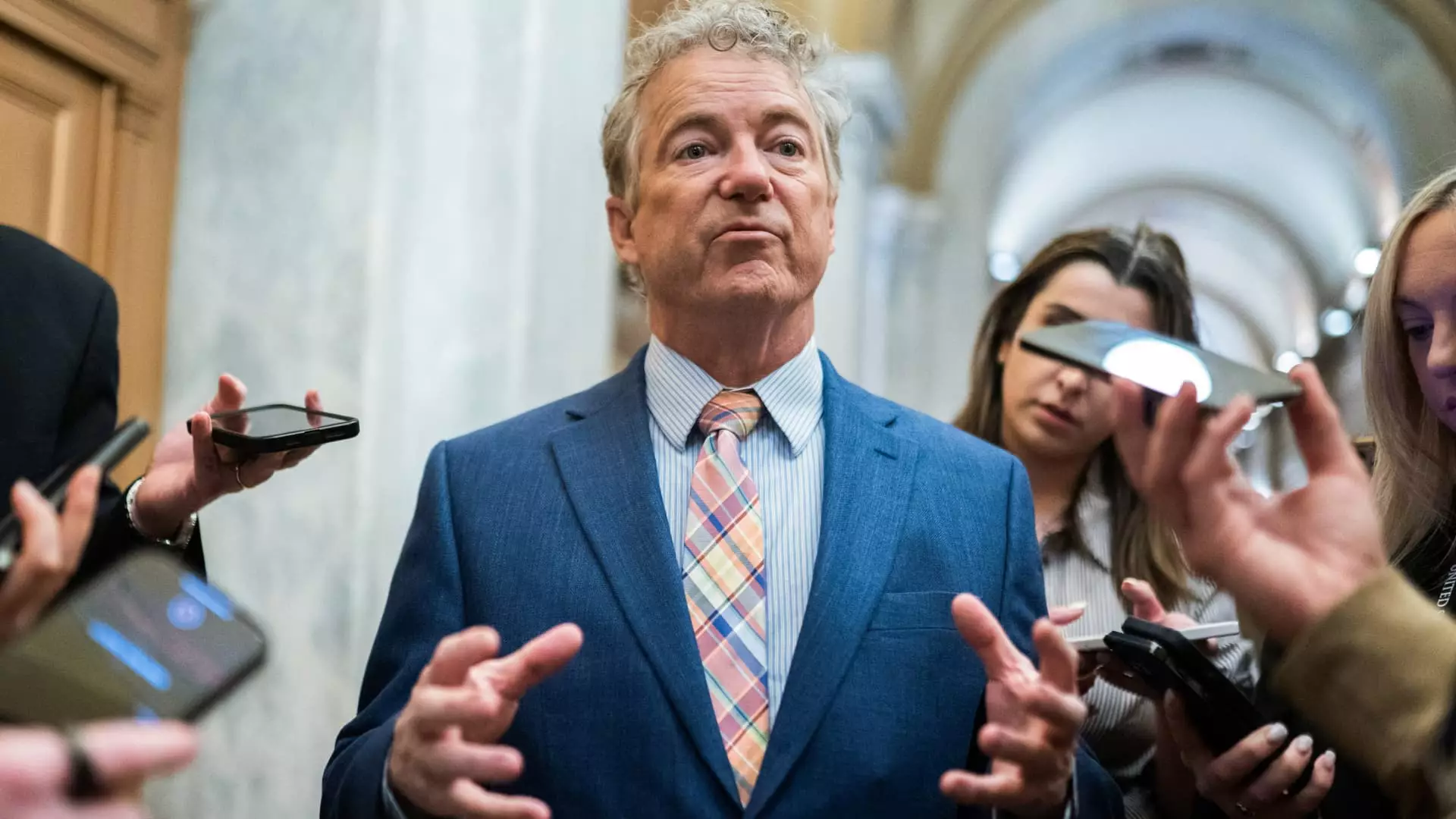In the murky waters of American politics, the recent spat between President Donald Trump and Senator Rand Paul illuminates the ideological schism that defines contemporary conservatism. Trump’s ambitious budget bill, which proposes a staggering increase of $5 trillion to the national debt ceiling, has faced fierce criticism from Paul, a libertarian stalwart committed to fiscal responsibility. This clash is not just a personal feud; it embodies fundamental disagreements about governance, economic growth, and the future of American fiscal policy. The conflict underscores a larger trend in which politicians prioritize short-term gains over the long-term stability of the nation’s economy.
Trump branded his budget plan as the “one big, beautiful bill,” but to Rand Paul, it represents a perilous gamble with the nation’s financial future. It is as if the President is placing a bet on a roulette table, hoping for growth while ignoring the looming threat of fiscal irresponsibility. The tension could be viewed as a microcosm of the broader divisions within the Republican Party, where traditional conservatives are increasingly at odds with populist factions that prioritize immediate political victories over sustainable policy-making.
The Inflationary Pitfall of Debt Accumulation
Critics of Trump’s budget proposal, including Paul, rightly highlight that the debt ceiling increase serves as a grim indicator of fiscal irresponsibility. The implication that an additional $5 trillion in debt would somehow lead to “tremendous GROWTH” is questionable at best and dangerously misleading at worst. While proponents argue that such spending could stimulate the economy, this line of reasoning overlooks the fundamental principle of economics: that unchecked spending today will lead to inflation and economic instability tomorrow. The insistence on tax cuts paired with enormous debt accumulation creates a volatile mix that endangers the future economic stability of all Americans.
Paul’s reservations about the rising debt are not baseless or extremist; they are rooted in a libertarian belief that government should live within its means. He has been vocal in stating that he is “just not open to supporting $5 trillion in debt ceiling increase.” This is not merely a matter of fiscal prudence; it encapsulates a broader philosophy of governance that espouses smaller government, lower taxes, and reduced spending, positioning Paul as a guardian of conservative principles in an age dominated by populist fervor.
The Pitfalls of Political Tribalism
Trump’s vitriolic responses to Paul reveal an alarming trend of political tribalism that has engulfed the GOP. Instead of engaging in constructive dialogue about the merits and flaws of proposed legislation, the President resorts to personal attacks, branding Paul’s ideas as “crazy” and “losers.” This vicious rhetoric does little to foster genuine policy discussion and further entrenches the divisive atmosphere that pervades American politics. The political landscape requires thoughtful debate and compromise, yet Trump’s method is emblematic of a politics that prioritizes winning over wisdom.
Perhaps the most disheartening aspect of this entire episode is the potential consequences for those directly affected by the policies at stake. The proposed budget significantly alters social support systems, including work requirements for Medicaid and reforms to the Supplemental Nutrition Assistance Program (SNAP). These changes could negatively impact millions of low-income Americans who rely on these services for survival. Sacrificing the welfare of vulnerable populations on the altar of fiscal expediency poses ethical questions that demand serious consideration.
The Consequences of Ignoring Fiscal Reality
As the budget moves through Congress, the reconciliation process allows Republicans to push through their agenda with a simple majority. However, this maneuver is laden with peril. The potential loss of just a few GOP votes—including dissenters like Paul—could derail Trump’s grand vision. By insinuating that dissenters are somehow deficient in understanding fiscal policy, Trump risks alienating reasonable voices within his party.
The danger here is not just immediate; it is multifaceted. If Republicans rally around a fiscally irresponsible budget, they overshadow the historical principles that have defined the party for decades. The path toward reckless spending without accountability is fraught with consequences, threatening not only the economy but the social fabric of the nation as well.
In a political landscape thirsting for new ideas and revived debates on the role of government, the choice between populist ideologies and traditional conservative values becomes more pressing. The dialogue must shift from personal vendettas to substantive discussions on economic sustainability. Only through this transformation can we aspire to create meaningful policies that benefit all Americans, not just the privileged few who thrive in a system of reckless debt accumulation.


Leave a Reply